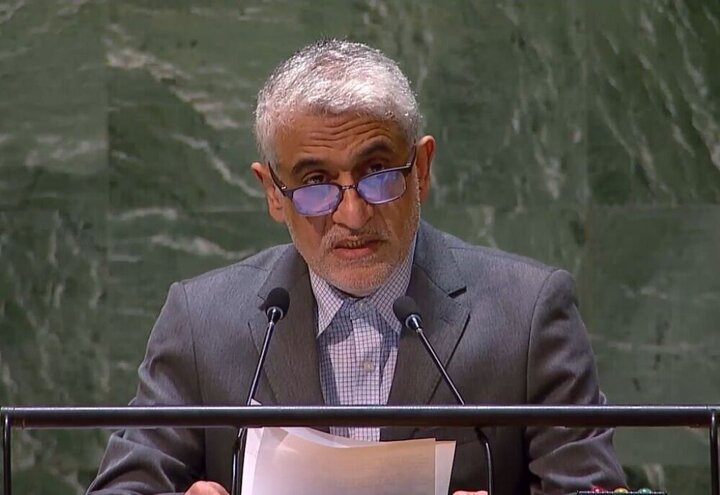TEHRAN ( WNAM MONITORING ): Iranian Ambassador and Permanent Representative to the UN Amir Saeed Iravani said that the future of Afghanistan must be determined by the Afghans themselves.
The Iranian ambassador to the United Nations stated that the future of Afghanistan must be determined by the Afghans themselves and belong to them, and that any solution imposed from outside is neither sustainable nor acceptable. He added, “The current authorities are an objective reality on the Afghan scene, and the international community has no choice but to interact with them.”
The full text of Iravani’s speech at the UN is as follows:
Statement by
H.E. Mr. Amir Saeid Iravani
Ambassador and Permanent Representative
of the Islamic Republic of Iran to the United Nations
Before UN Security Council Briefing
on “Situation in Afghanistan”
New York, 17 September 2025
Thank you, Mr. President, for convening this meeting.
We appreciate SRSG Ms. Otunbayeva for her valuable briefing.
We listened carefully to the statement delivered by Ms. Hanifa Girowal.
Mr. President,
The Islamic Republic of Iran expresses its profound sympathy and solidarity with the people and authorities of Afghanistan following the recent devastating earthquake, which tragically claimed numerous lives. In this regard, Iran has promptly extended humanitarian assistance to support the affected population and stands ready to continue assisting Afghanistan in overcoming the consequences of this tragedy.
We take note of the Secretary-General’s latest report (S/2025/554), which provides an update on situation in Afghanistan, including the UN political, and humanitarian activities.
In light of the report, I wish to highlight the following points:
First, As Afghanistan’s immediate neighbor—sharing over 900 kilometers of common border and having hosted millions of Afghan refugees for decades—Iran considers peace, stability, and development in Afghanistan as directly linked to our own national security and to the stability of the wider region. To this end, Iran remains actively engaged with Afghanistan’s de facto authorities through both bilateral and regional initiatives. We have also been constructively involved in the Doha process under United Nations auspices and have played an active role in its working groups.
Second, Afghanistan’s future must be Afghan-led and Afghan-owned. A lasting solution can only emerge through an inclusive political process that reflects the country’s ethnic and political diversity, respects its sovereignty, and guarantees the rights of all Afghans, particularly women and girls. Any externally imposed solution is neither viable nor sustainable.
Third, the de facto authorities (DFA) are a reality on the ground, and the international community has no choice but to engage with them. Constructive, practical engagement is essential to address the ongoing humanitarian and economic crises that continue to threaten regional stability. In this regard, we stress that humanitarian assistance must never be politicized. Sanctions should not be used as political leverage to obstruct economic stabilization or engagement with the de facto authorities. Afghan assets frozen abroad should be released unconditionally to serve the people. Likewise, the travel ban exemption mechanism for designated Taliban individuals must not be politicized or exploited for narrow political interests by Council members. Its full restoration is essential, as it remains a vital tool for fostering dialogue and advancing a comprehensive, constructive approach to the situation in Afghanistan.
Fourth, Iran has borne a disproportionate burden for decades, hosting millions of Afghan refugees and migrants, often with insufficient international support. This humanitarian responsibility has imposed significant costs on our society, placing severe strain on resources and infrastructure, and creating complex security and cross-border challenges. In the wake of Israel’s aggression against Iran, these pressures have intensified further. Iran cannot continue to shoulder this responsibility alone and has therefore had no choice but to return illegal Afghan residents to their homeland. It is important to note that Iran has been actively engaged with de facto authorities throughout the return process to ensure that the conditions for the safe and dignified return are met.
Mr. President,
Iran strongly supports the emergence of Afghanistan as an independent, united, and peaceful state—free from terrorism, conflict, and narcotics. We reaffirm our steadfast commitment to a stable and self-reliant Afghanistan and will continue to work closely with regional and international partners toward this objective. Afghanistan must be assisted in adopting comprehensive measures to eradicate terrorism, dismantle all terrorist groups without exception, and prevent the use of its territory against its neighbors, the region, and beyond.
And finally, Mr. President, UNAMA plays a crucial role in addressing Afghanistan’s challenges, and we reaffirm our support for its mandate and effective implementation.


